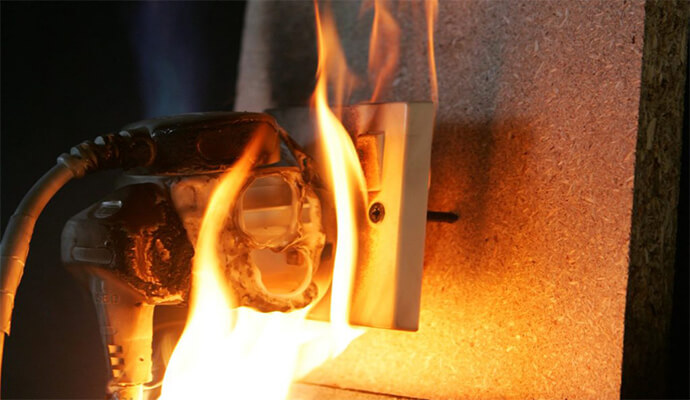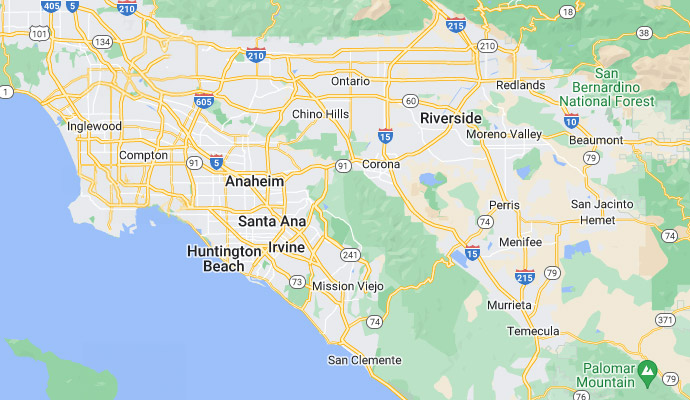
Electrical Fires, Damage and the Statistics
As stated by the National Fire Protection Association (NFPA), Home electrical fire damage accounts for an evaluated 51,000 fires each year. Almost 500 deaths, more than 1,400 injuries, and approximately $1.3 billion in direct property damage. This is a particular threat to residences built before the 1950s when electrical wiring standards were less strict than today. However, even modern homes are in danger of an electrical fire. Older houses were built to handle 30 amps of power, and newer homes demand 100 to 200 amps. This need places considerable pressure on a home’s wiring and electrical system resulting in catastrophic electrical fires.
Recognizing the common causes, warning signs, and appropriate safety measures can help prevent an electrical fire in your home. The most typical reasons are:
- Wiring installed Incorrectly
- Overloaded circuits and extension cords
- Defective or improper plugs, switches, and outlets
- Misuse and poor maintenance of lighting
It is essential to be informed of the hazards and potential causes of electrical fires to avoid them. In this blog post, we will look at some of the most common causes of electrical fires and how we can prevent them.
1. Plug Safety, Cords, and Outlets
Electric currents are carried by wiring, switches, plugs, and appliances that create heat. Excessive or uncontrolled heat can cause fires. To help prevent electrical fires, understand how to use and store plugs and electrical cords and take certain precautions:
- Never run cords under carpeting, bedding, or other flammable materials; also, avoid placing cables across doorways or regularly traveled areas
- Throw out frayed or broken cords and never knit two cables together
- Don’t overload sockets or use extension cords in place of outlets. Call an electrician specialist to install additional outlets as necessary
- Make sure plugs match snugly in outlets to prevent shock and excess heat.
2. Light Fixtures
Light fixtures, lamps, and light bulbs are other typical reasons for electrical fires. Placing a bulb with a wattage that is too large for the lamps and light fixtures is a leading cause of electrical fires. Always look at the maximum recommended bulb wattage on any lighting fixture or lamp and never go over the recommended amount.
Another reason for the fire is placing materials like cloth or paper over a lampshade. The material heats up and kindles, causing a fire. Defective lamps and light fixtures also frequently result in fires.
Light bulbs aren’t one-size-fits-all, so make sure to follow wattage guidelines for all light fixtures throughout your house. A 100-watt bulb in a light fixture that charges for a maximum of 60-watt bulb can make the whole thing catch on fire. That’s why it’s crucial to never go over the maximum wattage listed on your lighting fixtures.
- Buy lamps and fixtures approved by underwriter’s laboratories (UL), an independent and not-for-profit safety trial and certification organization
- Position lamps away from open windows where solid breezes may blow draperies onto hot light bulbs. Lampshades can also prevent combustible materials from close contact with a heated bulb.
3. The Dangers of DIY
When a wire is pierced but not completely separated, the electric flow can split away from its way and generate an incredible amount of heat. This current leaking is called an arc fault. The heat generated from an arc fault can eventually start a fire, which may quickly spread to surrounding wooden materials and other combustibles, as well as another wiring. Take special care when making home improvements to assure you do not harm any wires when hammering or drilling a nail into your walls.
You can prevent an arc fault from causing a fire by installing an arc-fault circuit interrupter to your circuit breakers. When arc fault circuit interrupters recognize abnormal current flow, they shut down the circuit to stop overheating and fire.
We also advise you to Use a stud finder to locate framing studs behind drywall and stop arc faults from happening. By nailing only into studs, you can avoid hitting and damaging hidden wiring. Stud finders are usually priced under $20.
4. Portable Heaters
Be mindful of where you place your heaters in the wintertime. Please don’t leave it on for an extended period, especially when you sleep or leave the house. Placing your portable heater next to curtains is one of the most frequent causes of fires.
If you use space heaters, use the radiator-type that diffuses heat over the entire surface of the machine. These are less likely to light flammable items but should still be kept away from them.
5. Outmoded electrical wiring
Outmoded electrical wiring often causes electrical fires. Suppose a home is over 20 years old. In that case, it may not have the wiring capacity to handle the vast volumes of electrical appliances in today’s average household, such as computers, wide-screen televisions, video players, microwaves, and the A/C.
The old home wiring cannot handle the increased power load. Older wiring tends to warm up fast and catches fire.
Sometimes it’s difficult to tell if you have old and unsafe wiring because electrical work is hidden behind the walls of your home most of the time. Remember, however, that wiring problems constitute a significant fire threat. Pay attention to these badges of hidden electrical issues:
- Frequently overloaded circuit breaker
- Appliances or electrical devices that feel unreasonably hot
- Shocks and flashes from devices or outlets
- Unexplained burning odors
- Flickering or dimming lights or occasional power outage
- Switches or outlets that emit an acrid odor
- Discolored cords, outlets, and switch plates
- Repeatedly blown fuses and tripped circuit breakers.
6. Surge protectors are your home’s best friend
When out shopping for extension cords or other needed additional outlets, we strongly consider surge protectors. They help prevent an outlet from dangers that come with a power surge. Power surges happen when an immense amount of electricity flows into your outlet and overloads it. This causes appliances to spark, which can cause a fire hazard.
Electrician experts can also help install ground fault circuit interrupters that serve as surge guards to keep your house secure.
7. Old Appliances:
Old appliances that have tattered cords or loose or damaged wiring can catch fire. Furthermore, due to the high flammability of traditional protectors used in these appliances, a simple solution like electrical repair to address these issues may not be sufficient. It’s best to acquire renewed devices to guarantee your security.
Having older appliances increases the possibility that they may not be up to today’s standards regarding wattage regulation, build material quality, and safety controls. Ovens, toasters, refrigerators, all the things you can find in your kitchen are at risk for potentially starting fires. Another issue with appliances and their correlation with fire occurs when multiple devices are plugged into extension cords. Or power strips that cannot withstand the vast quantity of energy that machines need.
Call and get an electrician to install appliance-grade outlets that are designed for the kind of appliance and homestead that you have.
8. Cutting off the third prong
Never separate the third prong on a power cord. The third prong (also known as the “ground”) is there for a goal: to defend you in case of an electric power surge or other electrical malfunction. If your house only has two-prong outlets, consider having an electrician specialist examine your home’s electrical system to see if they can modernize your outlets to three-prong units.
In Summary
Electrical fires are among the most dangerous forms of combustion due to how quickly they can spread and grow out of control. By following the information above, you can help reduce the chances of a fire occurring in your home.












